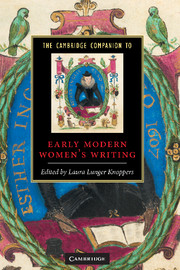Book contents
11 - Translation
from Part III - Genres and modes
Published online by Cambridge University Press: 28 July 2010
Summary
Writing to William Temple in September 1653, Dorothy Osborne complains bitterly about the quality of English translations of French romance: 'they were still soe much french in words and Phrases that twas impossible for one that understood not french to make any thing of them'. Osborne's attitude reveals a set of expectations about what a translation should be like; namely, that it should not betray its status as a translation at all, and that to do so is to put in place a significant barrier if not to comprehension, then to reading pleasure. It is a complaint more usually found in relation to texts assumed to have higher cultural status than romance - classical literature and scripture, for example - but it signals the crucial balance that the translator seeks to strike between fidelity or accuracy and comprehensibility. Osborne's complaint epitomizes the fact that sixteenth- and seventeenth-century England was what translation theorists designate a ' target culture'. Technically, this means that translation activity into English was focused on the perceived needs of English culture, rather than on respecting the cultural or historical integrity of the 'source culture'. This statement, whilst broadly true, conceals as much as it reveals. Translation activity in early modern England is variegated, multiple and serves a host of different functions; it is both literary (broadly defined) and pragmatic (practical manuals of instruction, as well as legal and trading documents).
- Type
- Chapter
- Information
- The Cambridge Companion to Early Modern Women's Writing , pp. 167 - 180Publisher: Cambridge University PressPrint publication year: 2009
- 14
- Cited by

